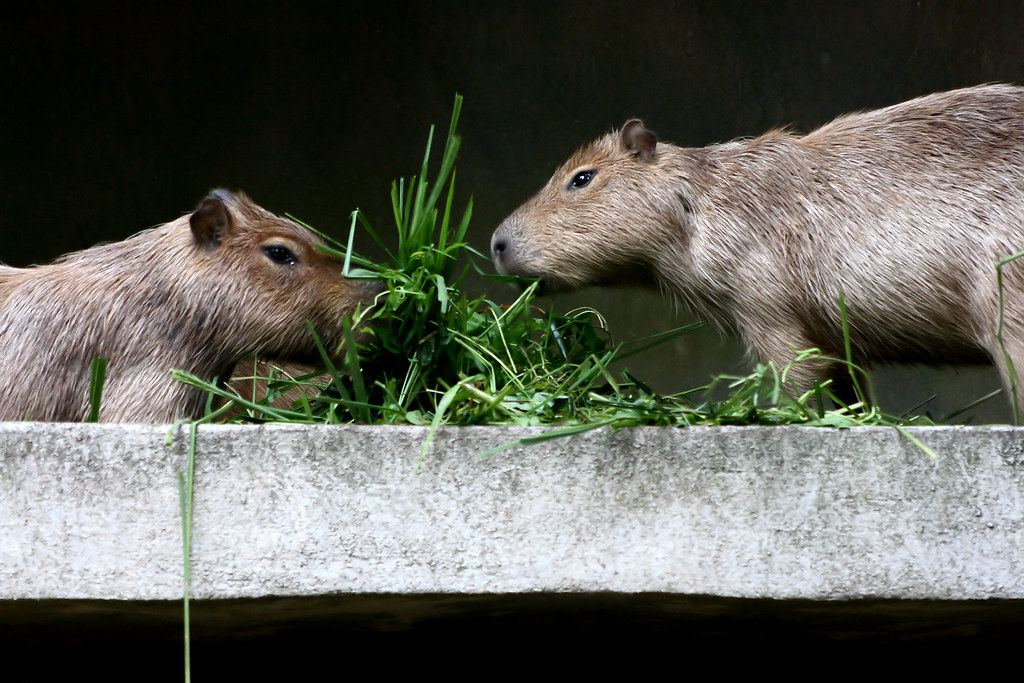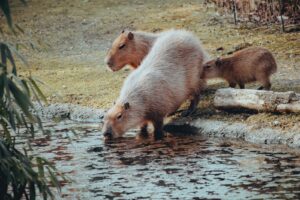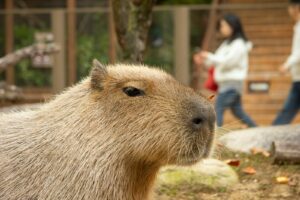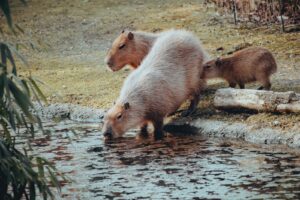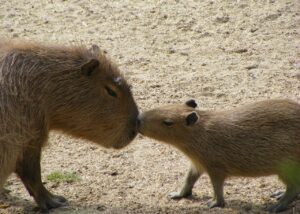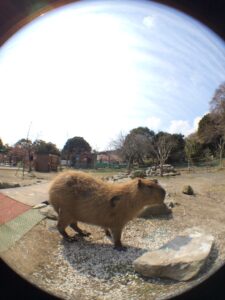Are you curious about what to feed your capybara to ensure a happy and healthy furry friend? Look no further—this article is here to debunk the myths and unpack the facts about capybara cuisine.
From rumors of these gentle creatures feasting on raw meat to claims that a vegan diet is the only way to go, it’s time to separate fact from fiction. We’ll delve into the nutritional needs of capybaras and explore the range of foods that can satisfy their dietary requirements. Whether you’re concerned about protein intake or curious about the truth behind those “capybaras only eat grass” rumors, we’ve got you covered.
In this comprehensive guide, we’ll provide you with expert advice on balanced diets, portion sizes, and the benefits of incorporating fresh produce into your capybara’s meals. Gain the knowledge you need to ensure that your capybara stays healthy and happy with a diet tailored to their unique needs. Let’s separate the myths from reality and embark on this culinary journey together.
The Truth About Capybaras’ Dietary Needs
Myth: Capybaras Can Eat Anything
It’s a common misconception that capybaras can eat anything that comes their way. While capybaras are known for their ability to forage for food, it doesn’t mean they can consume just anything. Capybaras have specific dietary needs that must be met to ensure their overall health and well-being.
In the wild, capybaras primarily feed on grasses, aquatic plants, and a variety of fruits and vegetables. However, it’s important to note that not all vegetation is safe for capybaras to consume. Certain plants can be toxic and should be avoided. Some plants to avoid include azaleas, daffodils, and lilies, which are toxic and can cause severe health issues. It’s crucial to do thorough research and consult with a veterinarian to determine which foods are safe for your capybara.
Myth: Capybaras Are Strictly Herbivores
While it’s true that capybaras primarily consume plant-based foods, they are not strictly herbivores. Capybaras are classified as herbivorous, but they do occasionally eat small amounts of animal protein. In the wild, capybaras have been known to consume insects and even carrion. However, this does not mean that a diet consisting of raw meat is suitable or healthy for capybaras.
A balanced diet for capybaras should primarily consist of vegetation, but it’s also important to provide them with small amounts of high-quality protein sources. This can be achieved through commercially available capybara pellets or by incorporating small amounts of cooked lean meat or eggs into their diet. Consult with a veterinarian to ensure that the protein sources you choose are appropriate for your capybara’s specific needs.
Fact: Capybaras Require a Balanced Diet
To ensure the overall health and well-being of your capybara, it’s essential to provide them with a balanced diet. A balanced diet for capybaras should consist of a variety of foods that meet their specific nutritional needs. This includes a combination of high-quality grasses, fresh fruits and vegetables, and small amounts of protein sources.
Grasses should make up a significant portion of your capybara’s diet. They provide essential fiber and nutrients that aid in digestion and overall gut health. Fresh fruits and vegetables should also be included to provide additional vitamins and minerals. It’s important to offer a variety of fruits and vegetables to ensure a diverse nutrient intake. Leafy greens, carrots, bell peppers, and berries are excellent choices that can provide a well-rounded nutritional profile.
Protein sources, although consumed in smaller amounts, are also crucial for capybaras. They provide essential amino acids that contribute to muscle growth and repair. Choose lean protein sources and ensure they are cooked thoroughly to eliminate any potential bacterial contamination.
By providing a balanced diet, you can ensure that your capybara receives all the necessary nutrients for optimal health and longevity.
Debunking Common Misconceptions About Capybara Diet
Fiction: Capybaras Can Eat Only Grass
Contrary to popular belief, capybaras cannot survive on grass alone. While grass is a significant part of their diet, it does not provide all the necessary nutrients for their overall health and well-being. Capybaras require a diverse range of foods to meet their nutritional needs.
In the wild, capybaras have access to a variety of vegetation, including aquatic plants, fruits, and vegetables. By replicating this diverse diet, you can ensure that your capybara receives a wide range of essential vitamins, minerals, and antioxidants. Incorporating fresh produce into your capybara’s meals not only provides additional nutrients but also adds variety and enrichment to their diet.
Fiction: Capybaras Can Eat Processed Human Food
It’s important to note that capybaras should not be fed processed human food. While capybaras may show interest in your snacks or meals, it’s essential to resist the temptation to share. Processed human food is often high in unhealthy fats, sugars, and additives that can be harmful to capybaras. Feeding capybaras processed human food can lead to nutritional imbalances, obesity, and other health issues. It’s crucial to provide them with a diet that is specifically tailored to their nutritional needs. Capybaras thrive on a diet consisting of fresh, natural, and unprocessed foods.
Proper Nutrition for Capybaras
Proper nutrition is essential for the health and well-being of capybaras. By understanding their dietary needs and debunking common myths, you can ensure that your capybara stays healthy and happy. A balanced diet consisting of grass, fresh produce, and small amounts of protein sources will provide your capybara with the necessary nutrients for a long and fulfilling life.
Grasses and Forage: The Staple of Capybara Diet
In the wild, capybaras consume a variety of grasses that provide the bulk of their nutritional intake. These grasses are rich in fiber, which aids in digestion and helps maintain a healthy gut flora. As a capybara owner, it’s essential to provide your pet with a constant supply of high-quality hay, such as timothy or orchard grass, to mimic their natural diet. Hay should be available at all times to ensure your capybara can graze whenever they choose.
Fresh Produce: A Vital Addition
Fresh fruits and vegetables play a crucial role in the diet of capybaras. These foods provide essential vitamins and minerals that are not available in sufficient quantities from grasses alone. Leafy greens such as kale, spinach, and romaine lettuce are excellent choices, as well as root vegetables like carrots and sweet potatoes. Additionally, fruits like apples, berries, and melons can be offered in moderation as treats. It’s important to wash all produce thoroughly and cut it into manageable pieces to prevent choking.
Protein Sources: Balancing the Diet
While capybaras primarily thrive on a plant-based diet, occasional protein sources can be beneficial. Commercially available capybara pellets are formulated to provide balanced nutrition and often contain necessary proteins. Alternatively, you can offer small amounts of cooked lean meats or boiled eggs. Always consult with your veterinarian to determine the appropriate portion sizes and frequency for your capybara’s protein intake.
Water: The Essential Nutrient
Access to fresh, clean water is paramount for capybaras. Ensure that your pet always has access to water for drinking and, if possible, a shallow pool for swimming. Capybaras use water not only for hydration but also for regulating their body temperature and maintaining their skin and coat health. Regularly clean and refill their water sources to prevent contamination.
Conclusion: Ensuring Your Capybara’s Nutritional Health
By understanding the dietary needs of capybaras and debunking common myths, you can provide your pet with a balanced and nutritious diet. Remember to offer a variety of high-quality grasses, fresh fruits, and vegetables, and appropriate protein sources. Avoid feeding your capybara processed human food and always consult with a veterinarian for personalized advice.
